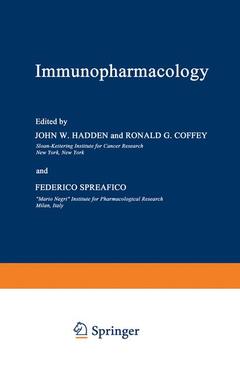Description
Immunopharmacology, Softcover reprint of the original 1st ed. 1977
Comprehensive Immunology Series, Vol. 3
Coordinator: Hadden J.
Language: English
Subject for Immunopharmacology:
Keywords
Thymus; blood; immunoglobulin; inflammation; lymphocytes; pharmacology
Publication date: 11-2012
423 p. · 20.3x25.4 cm · Paperback
423 p. · 20.3x25.4 cm · Paperback
Description
/li>Contents
/li>
Immunopharmacology: A New Discipline of Immense Potential Among the looming triumphs of the biologic revolution is the rapidly developing understanding of the mechanisms of bodily defense. In the short span of 35 years, knowledge of immunologic machinery has progressed from crudest description to major understanding in cellular and molecular terms. Antibodies, immunoglobulins, and the complement system have been almost completely defined in detailed molecular terms. Organs, like thymus, spleen and lymph nodes-so long enigmatic black boxes-are beginning to be understood not only in cellular terms but in molecular, physiologic, and endocrinologic terms. With this surging new information about the immune system comes the possi bility of developing a pharmacology which can modulate and control immunologic functions. Immunopharmacology most broadly conceived must address (1) control of development and function of the cellular components of the immunologic appara tus; (2) facilitation and suppression of function of the immunologically competent cells of the several subclasses, like T helpers, suppressors, and effectors, and B effectors and suppressors; (3) manipulation and repair of the major biologic amplifi cation systems, e. g. , the complement system and kinin-kallikrein system, and (4) utilization, modulation, and inhibition of the galaxy of molecules generated by T lymphocytes, the lymphokines. This new pharmacology must deal with the funda mental effector mechanisms of immunity, namely inflammation, phagocytosis, vascular reactivity, and blood coagulation. Furthermore, immunopharmacology must address and manipulate cell-cell communication and interaction, so vital to control of the immunological apparatus.
1 Cyclic Nucleotides in Lymphocyte Proliferation and Differentiation.- 2 Involvement of Cyclic Nucleotides as Intracellular Mediators in the Induction of Antibody Synthesis.- 3 Regulation of Alloimmunity by Cyclic Nucleotides.- 4 Regulation of Polymorphonuclear Leukocyte, Macrophage, and Platelet Function.- 5 Molecular Aspects of Macrophage Activation and Proliferation.- 6 Pharmacological Control of Mediator Release from Leukocytes.- 7 Generation, Function, and Disposition of Chemical Mediators of the Mast Cell in Immediate Hypersensitivity.- 8 Plasma Factors: The Hageman-Factor-Dependent Pathways and the Complement Sequence.- 9 Prostaglandins in the Regulation of Immune and Inflammatory Responses.- 10 Lymphokines: Physiologic Control and Pharmacological Modulation of Their Production and Action.- 11 Mechanism of Action of Antiallergic Drugs and Relationship of Cyclic Nucleotides to Allergy.- 12 Modulation of the Expression of the Immune Response by Antiinflammatory Drugs.- 13 Immunosuppressive Agents.- 14 Mechanisms of Immunopotentiation.- 15 Immunoassay of Drugs and the Biological Use of Antidrug Antibodies.- 16 Receptors for Low-Molecular-Weight Hormones on Lymphocytes.- 17 Polypeptide Hormone Receptors on Lymphoid Cells: Application to the Study of Receptor Alterations and Radioreceptor Assay of Polypeptide Hormones.- 18 Assays for Cyclic Nucleotides Including Clinical Applications.
© 2024 LAVOISIER S.A.S.
These books may interest you

Immunopharmacology 69.01 €

Immunopharmacology and Inflammation 210.99 €


